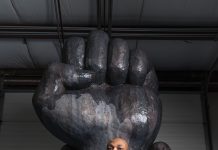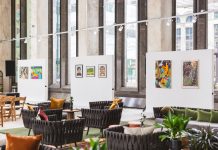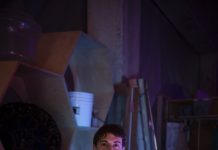
In 2016, when curator, writer, and artist, Amani Olu came to Detroit by way of New York City, he knew he wanted to contribute to the city’s cultural landscape beyond his work as an art publicist. This year, Olu & Company, the marketing consultancy he founded for artists and art-related businesses, will introduce Detroit Art Week. Held between July 20-22, Detroit Art Week will include museum tours, site visits, artist talks, and other special programs. Here, the Philadelphia native shares his journey bringing DAW to life and his hopes to make Detroit the next great art hub.
Hour Detroit: What was the process for curating the talent and spaces for Detroit Art Week?
Amani Olu: We put together an advisory board and set ourselves up as a nonprofit. I always said to people when pitching the idea, ‘Think of Art Basel in Miami, Bushwick Open Studios [in Brooklyn, N.Y.], Dallas Art Fair. This is what I want it to be.’ I want people coming to Detroit from all over the world to hang out in galleries, eat good food, and see great art. (Maybe we all do a little business, too.) It was less about curating the work and galleries, and more about who we think does great stuff that would give visitors a sense of how diverse and dynamic the art scene is.
Why did you decide to honor veteran artists Carole Harris and Allie McGhee?
For the first [Detroit Art Week], I wanted to make a statement that we are celebrating our elders. [Allie and Carole] have been here making work for 40, 50 years, and created their own language within the larger vocabulary around abstract art. Both are the finest Detroit black abstract expressionists I’ve seen in my time here. The first program is a conversation with me, Allie, and Carole [at Detroit Institute of Arts on Friday, July 20]. Then, we’re having a dinner at Flowers of Vietnam after. I also curated a museum show of their work. The three things we’re sanctioning on the first night will revolve around them because we want to make it clear that they are the hometown heroes.

Other program highlights include a studio visit at Tyree Guyton’s nonprofit community arts organization the Heidelberg Project, and Fête, a party benefiting Detroit Cristo Rey High School’s art education program. Why further the conversation through these events?
Heidelberg is a large-scale, public art installation that’s open 24 hours and accessible to all. I didn’t know about it before I moved here. We want to show people that it’s not just about going into this white cube and looking at art on a wall. People are making art in all kinds of ways. Detroit Cristo Rey High School has an art education program, and [Fête is] our philanthropic aspect. We wanted to do something that was going to benefit the next generation. We’re doing this party with [music producer] Black Noi$e, [DJ] BEIGE, and [music producer] Waajeed. A portion of the ticket sales will go to the school.
What does Detroit’s current art scene look like to you?
What makes Detroit unique is the space here. Space is really important, not just in terms of physically creating, but to just think of ideas. The work here is not being made to service the market. I’m not saying it doesn’t get shown and sold, I’m saying that there’s not the same kind of pressure like really well-established art markets where the demand can be hard on an artist. And when I say “established,” I’m talking about money, it’s about the money that’s moving the market. Detroit has an advantage; I lived in New York for 12 years and did a lot of cool stuff. But I never did an art week; there’s no space for that to happen in a meaningful way where people get excited. The work here tends to be honestly edgier than more of the established art markets. I’ve seen some things here that I was blown away by.
What are the biggest takeaways you hope guests have from this event?
I want people to feel there’s something new to participate in that doesn’t exclude them. If you’re local, the main takeaway is: “I’m proud of my city, I’m excited.” If you’re a visitor coming in, I want you booking your hotel for next year when you leave. Or, they have their own projects and want to figure out how we can work together to bring what they do to Detroit. We don’t live in a vacuum. A lot of artists here are from all over the place. We have to make sure we’re having a dialogue with international art in this community; that’s how things move forward. I want it to be the biggest cultural event in Detroit, the Midwest, maybe in the country. I want those numbers to drive the economy; not just in terms of art sales, but also our businesses, boutique hotels, restaurants, and shops. We already know what art can do for a community, we have to organize everything and build on top of that. There’s no reason there shouldn’t be a multi-million-dollar event, or we shouldn’t receive funding from as many possible sources just based on the potential of what this can do.
For more information, visit detroitartweek.org.
Related: 10 Metro Detroit Art Exhibits to Visit This Summer
|
|
|









